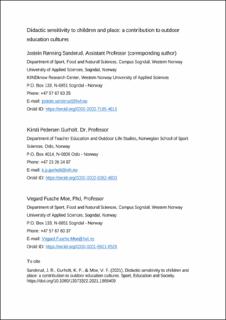Didactic sensitivity to children and place: a contribution to outdoor education cultures
Peer reviewed, Journal article
Accepted version
Permanent lenke
https://hdl.handle.net/11250/2779084Utgivelsesdato
2021Metadata
Vis full innførselSamlinger
- Import fra CRIStin [3604]
- Institutt for idrett, kosthald og naturfag [1006]
Originalversjon
Sanderud, J. R., Gurholt, K. P., & Moe, V. F. (2021). Didactic sensitivity to children and place: a contribution to outdoor education cultures. Sport, Education and Society, 1-14. 10.1080/13573322.2021.1966409Sammendrag
There is a tendency in European education policy to emphasise more and better deliberate learning outcomes. The tendency is criticised for taking an instrumental view of education (Biesta, 2010, 2016, 2020a; van Manen, 2008) and threatening children’s self-governed play opportunities (Pettersvold & Østrem, 2019). However, self-governed play outdoors is perceived as educationally important, notably within Nordic early childhood education. This paper aims to contribute to the international debate on what constitutes good education by investigating an outdoor education culture framed within the context of Nordic early childhood education. We investigate the research question of what characterises teachers’ outdoor didactics in self-governed play and growth as these appear in a Norwegian nature kindergarten? The theoretical framework builds on 1) perspectives on Bildung as playful self-formation (Løvlie, 2002; Steinsholt, 2010) and 2) a relational perspective on children’s self-governed outdoor play as a way of integrated dwelling and growth through intimate correspondence with environments (Ingold, 2000, 2007, 2018). Data were generated through ethnographic fieldwork in a public Norwegian nature kindergarten that emphasises children’s outdoor play as educationally important. Nineteen children aged 4 to 6 participated. The fieldwork drew on participant observation, including playing with the children and on-site conversations. Using the theoretical framework as a lens, the educational culture is conceptualised as didactic sensitivity, which entails the teachers’ delicate sensitivity and responsiveness towards children and place. The teachers act professionally by creating unique, thoughtful, responsive, and situated conditions for children’s autonomous growth in natural environments.
Beskrivelse
This is an accepted manuscript version of an article published by Taylor & Francis in Sport, Education and Society on 15 Aug 2021, available online: https://doi.org/10.1080/13573322.2021.1966409
